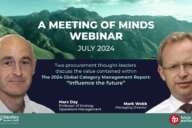
Blog
Lessons for Category Managers from 2021
By Mark Hubbard |
What a year. I am sure we are all looking at 2021 as particularly challenging for a whole host of reasons, both professionally and personally. It is well worth reflecting on any insights that living through such times provides, with this in mind here are my lessons for category managers for 2021.
Self-care
At a personal level, the need to look after our own well-being, amongst the turmoil of the past twelve months, has stood out as something to try to manage. Much as working from home has many benefits, one of the downsides is losing the boundary between home and work. It is entirely possible to sink into a work/sleep cycle and forget the need to maintain yourself through reflection, exercise and investing in friendships and interests. There are times when the accumulation of events combines to mean that more self-care is necessary. I know that I have been variable at this through the year, and I think I’m a lot more effective when I have that balance right.
Having seen several people struggle with health this year is also a reminder to take the necessary time and effort to remain healthy, as far as circumstances allow. Given the alternatives, making room for whatever approaches you need to follow seems sensible.
Flexibility
A significant form of stress for many is the loss of elements of control over what they are doing. Current circumstances mean that many people are buffeted by change, different demands, and calls on time-varying daily. So how do we adapt to the need for extreme flexibility when it’s like this, being able to bend without breaking? Maintaining a focus on the endpoint we’re trying to get to is a real challenge; it is easy to let go without thought, more challenging to maintain direction and focus while still being flexible. Objective setting and management is a real challenge, given how corporate systems appear to be set up with minimum flexibility and interaction between different parts of organizations. Perhaps better objectives would include flexibility and approach to ensure that the changes we need to incorporate make it into the outcomes we agree.
Applying category management
A regular insight through the year is the challenge of getting the principles behind category management across to people who have to apply them. Many, of course, have seen the principles outlined in CIPS courses. However, translating that into insights that work in our day-to-day environments is often a next-level challenge. The theory all works well; however, getting to meaningful insights usually requires a lot of thought around the implications of being in a particular ‘box’ in various models (like Kraljik). Knowing to ask a couple of relatively simple questions can help. This would include ‘if I am in this box, what is the maximum value I can extract here, how would I do that, and ‘what would it take to move into a different box’. Developing good answers to both of these is a solid starting point to building a strategy.
The return of PESTLE
A few years ago, PESTLE analysis was unpopular and uninteresting for many. It is a less exciting tool with well-established supply chains in a relatively stable economy. It is a significant area of focus in today’s climate as teams map out the broad risk environment they are inhabiting. Impacts come from all directions; pandemic, interest rate rises, changes in border control and export approaches, net-zero carbon, taxation policies, workforce shortages, materials shortages, transport disruption.
Anything that helps us map this complex mix has to help, and it still works well. Of course, making sure we go beyond a single word description of the risk is essential; we should be describing the risk and move on to how we might deal with it to get the most out of the tool.
Looking forward
So there are my key lessons for category managers for 2021.
Does 2022 feel like it will be dramatically different? There’s likely to be the same pressures, the same instability that we’ve seen this year. We can adopt good techniques to help us with that, and making a little space to do that and look after our well-being should be a priority for all of us.
Best wishes for a fantastic new year!

About Mark Hubbard
Director
30+ years experience in procurement and supplier management, in line and consulting roles
Previous employment: Positive Purchasing Ltd, SITA,
QP Group, BMW, SWWS, Rover
Education: BSc in Engineering Metallurgy, MBA University of Plymouth
CIPS: Member




